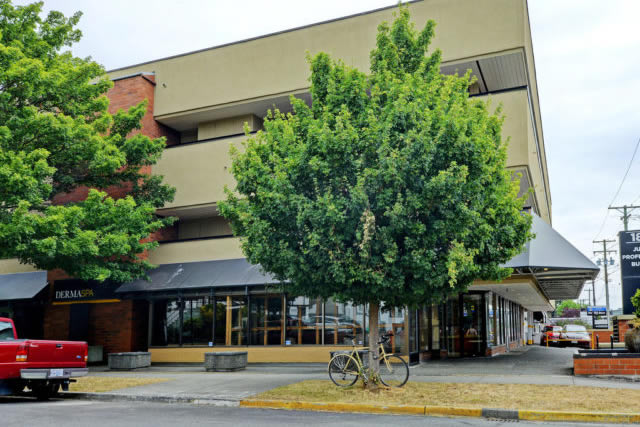With immense respect and gratitude, we raise our hands to the Lekwungen and WSÁNEĆ peoples who are the original caretakers of the traditional and ancestral lands on which our offices stand. We acknowledge the historical and ongoing harm the mental health field can perpetuate, and take our responsibility to mitigate this harm with imperfection and accountability. We express our deep appreciation to Elders and Old Ones – past, present and emerging, and honour the generational resistance against all forms of colonial violence.
Oak Bay Office
303A-1830 Oak Bay Ave
Located in the Jubilee Professional Building on Oak Bay Ave, this wheelchair accessible office has its own private waiting room, a play therapy room, a warm and inviting consult room for older kids and adults and private outdoor deck space. There are bathrooms on site and paid parking is available as well as free street parking in the neighbourhood. This office also offers secure, complimentary wifi access.
Westshore Office
115-494 Goldstream Ave
Centrally located opposite the Royal Colwood Golf Club on Goldstream Ave, our Westshore office has plenty of space for play therapy, art therapy, group and family therapy as well as movement-based therapies such as trauma-informed yoga. We offer secure, complimentary wifi access as well as free on-site visitor parking (off Kristina Pl) as well as plenty of free street parking along Goldstream Ave. This location is wheelchair and stroller accessible.















Locate Us
Frequently Asked Questions
What is play therapy?
Is my child too old for play therapy?
What are the various letters behind each counsellor’s name and what do they mean?
The term ‘counsellor’ is not a protected profession in the province of B.C. This means that anyone can call themselves a counsellor and work in private practice. It is the client’s responsibility to ensure that the counsellor they choose has the proper training and registrations to ensure a safe and ethical counselling process. Furthermore, figuring out what kind of counsellor you need or what may be covered by your extended health plan can be confusing! Here is a breakdown of the most important abbreviations:
M.A./M.Ed. - this means the counsellor has completed a master’s level degree such as a master of arts or a master of education in counselling psychology. A master’s degree is required for registration with most counselling associations.
R.C.C. - Registered Clinical Counsellor. This designation is provided by the British Columbia Association of Clinical Counsellors (BCACC). A person with this designation has completed a master’s level university program in a counselling-related field along with at least 2000 hours of supervised clinical experience with a university-appointed supervisor. This designation requires that the therapist adhere to a specific code of ethics and disciplinary action can be taken against the therapist in the event of an ethical violation. Some extended health plans provide coverage for registered clinical counsellors. To learn more about this designation click here: https://bc-counsellors.org/
C.C.C. - Certified Clinical Counsellor. This designation is provided by the Canadian Counselling and Psychotherapy Association. The requirements for this designation are similar those set out by the BCACC but it is Canada-wide rather than province-specific. To learn more about this designation click here: https://www.ccpa-accp.ca/
R.S.W./R.C.S.W. - Registered Social Worker or Registered Clinical Social Worker. These designations are provided by the British Columbia College of Social Workers. The Registered Social Worker designation requires a Bachelor of Social Work degree, or equivalent, as well as successful completion of the board exam. The Registered Clinical Social Worker designation requires a Master of Social Work degree along with 3000 hours of supervised clinical experience and successful completion of the clinical board exam. Both RSWs and RCSWs must adhere to a strict code of ethics, proof of continued education each year, and are permitted to work in private practice however Registered Clinical Social Workers are also permitted to assess and diagnose mental health disorders. These are protected professions in BC which means that you may not call yourself a registered social worker unless you are a member of the college. In addition, a college is legally responsible for the conduct of its members (unlike an association which focuses more on promoting the profession and advocating for its members). For this reason, many extended health plans provide more coverage for registered social workers than they would for a registered clinical counsellor. To learn more about this designation click here: http://www.bccollegeofsocialworkers.ca/
R.Psyc - Registered Psychologist. This designation is given by the British Columbia College of Psychologists and requires completion of an accredited doctoral program (PhD or PsyD), a clinical internship, several years of supervised clinical experience and successful completion of both a written and oral exam. Alternatively, if you are a registered psychologist with a college in another Canadian province, you can apply to have your designation transferred to B.C. as long as you pass the board exams (each province has their own educational requirements for joining their college of psychologists). Registered psychologists must adhere to a strict code of ethics and are subject to disciplinary action by the college should that code be violated. It is a protected profession which means that you may not call yourself a registered psychologist unless you are a member of the college. Most extended health plans provide coverage for Registered Psychologists however their fees tend to be higher due to the requirement of more education and training. Psychologists are permitted to assess and diagnose mental health disorders. To learn more about this designation, click here: https://collegeofpsychologists.bc.ca/
I’ve seen other letters after a counsellor’s name that aren’t listed here. What do they mean?
Oftentimes, after receiving their initial registrations, counsellors/psychotherapists will go on to specialize in certain areas. There are many associations across the world that offer certification in specific counselling modalities, each of which have their own set of requirements. Some of the more popular ones are:
R.P.T./C.P.T./B.C.R.P.T. - Registered Play Therapist designations from several different governing bodies (R.P.T. = Association for Play Therapy, C.P.T. = Canadian Association for Play Therapy, B.C.R.P.T. = BC Assocation for Play Therapy). If you see an ‘S’ after any of these it means the counsellor has also obtained the ‘supervisor’ designation and is permitted to help train individual counsellors working towards their own registration. Obtaining this registration means having participated in at least 150 hours of play therapy specific training along with 500 hours of experience and 35+ hours of clinical supervision. Continuing education is also required to ensure practitioners remain up to date in their training. For more information visit Association for Play Therapy (https://www.a4pt.org/), BC Association for Play Therapy (https://www.bcplaytherapy.ca/) or Canadian Association for Play Therapy (https://cacpt.com/)
C.T.T.S. - Certified Trauma Treatment Specialist. This designation is offered by the Association of Traumatic Stress Specialists and requires a minimum of 200 hours of trauma-specific training in several different competency areas, along with supervised clinical experience and references. This designation also requires continuing education to ensure practitioners remain up to date in their training. For more information on this designation click here: https://www.atss.info/
R.M.F.T. - Registered Marriage and Family Therapist. This designation is offered by the British Columbia Association for Marriage and Family Therapy. For more information on this designation click here: http://www.bcamft.bc.ca/













